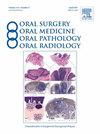在一组口腔鳞状细胞癌的免疫组织化学研究中,抗ephrin - b2抗体对其他Ephrin-B成员的交叉反应性研究
Oral surgery, oral medicine, oral pathology, oral radiology, and endodontics
Pub Date : 2022-04-12
DOI:10.3390/oral2020015
引用次数: 0
摘要
Ephrin-B1、-B2和-B3蛋白具有高度的序列相似性。这些蛋白在包括口腔鳞状细胞癌(OSCC)在内的人类癌症中作为推测预后标志物的研究,由于无法产生针对它们的特异性抗体而受到限制。本研究检测了一种多克隆抗人ephrin-B2抗体(HPA008999)对ephrin-B蛋白的反应性,并探讨了同一抗体在OSCC标本不同肿瘤内部位的免疫反应性对预后的意义。通过对转染EFNB1、EFNB2或EFNB3表达构建体的HEK-293T细胞裂解物和沉淀物进行氨基酸序列比较、免疫细胞化学和Western blot分析,我们证明HPA008999能与所有ephrin-B蛋白发生反应。在131例OSCC患者中使用HPA008999抗体进行免疫组化(IHC),我们发现肿瘤中心的免疫反应性高,而肿瘤侵袭前部的免疫反应性不高,这与较差的5年总生存率显著相关。综上所述,HPA008999抗体对所有ephrin-B蛋白均有反应,肿瘤中心的免疫反应性可作为OSCC的预后指标。这些数据强调,为了在基于免疫组化的生物标志物研究中获得可靠和有意义的结果,需要研究与相似蛋白成员交叉反应的抗体。本文章由计算机程序翻译,如有差异,请以英文原文为准。
Investigation of Cross-Reactivity of Anti-Ephrin-B2 Antibody to Other Ephrin-B Members in an Immunohistochemical Study in a Cohort of Oral Squamous Cell Carcinoma
Ephrin-B1,-B2 and -B3 proteins share a high degree of sequence similarity. Investigation of these proteins as putative prognostic markers in human cancers including oral squamous cell carcinoma (OSCC) has been limited by challenges in generating specific antibodies against them. The current study examined the reactivity of a polyclonal anti-human ephrin-B2 antibody (HPA008999) against ephrin-B proteins and investigated the prognostic significance of immunoreactivity of the same antibody at different intra-tumor sites in OSCC specimens. By amino acid sequence comparison, immunocytochemistry and Western blot analysis on cell lysates and precipitates from HEK-293T cells transfected with EFNB1, EFNB2, or EFNB3 expression constructs, we demonstrated that HPA008999 reacted to all ephrin-B proteins. Using immunohistochemistry (IHC) with the HPA008999 antibody in a cohort (n = 131) of OSCC, we showed high immunoreactivity at the tumor center, but not at the tumor invading front, was significantly associated with worse 5-year overall survival probabilities. In conclusion, the HPA008999 antibody reacted to all ephrin-B proteins and the immunoreactivity at the tumor center might be useful as a prognostic marker in OSCC. These data underscore the need for the investigation of antibodies for cross-reactivity to similar protein members for obtaining reliable and meaningful results in IHC based biomarker studies.
求助全文
通过发布文献求助,成功后即可免费获取论文全文。
去求助
来源期刊
自引率
0.00%
发文量
0
审稿时长
1 months

 求助内容:
求助内容: 应助结果提醒方式:
应助结果提醒方式:


